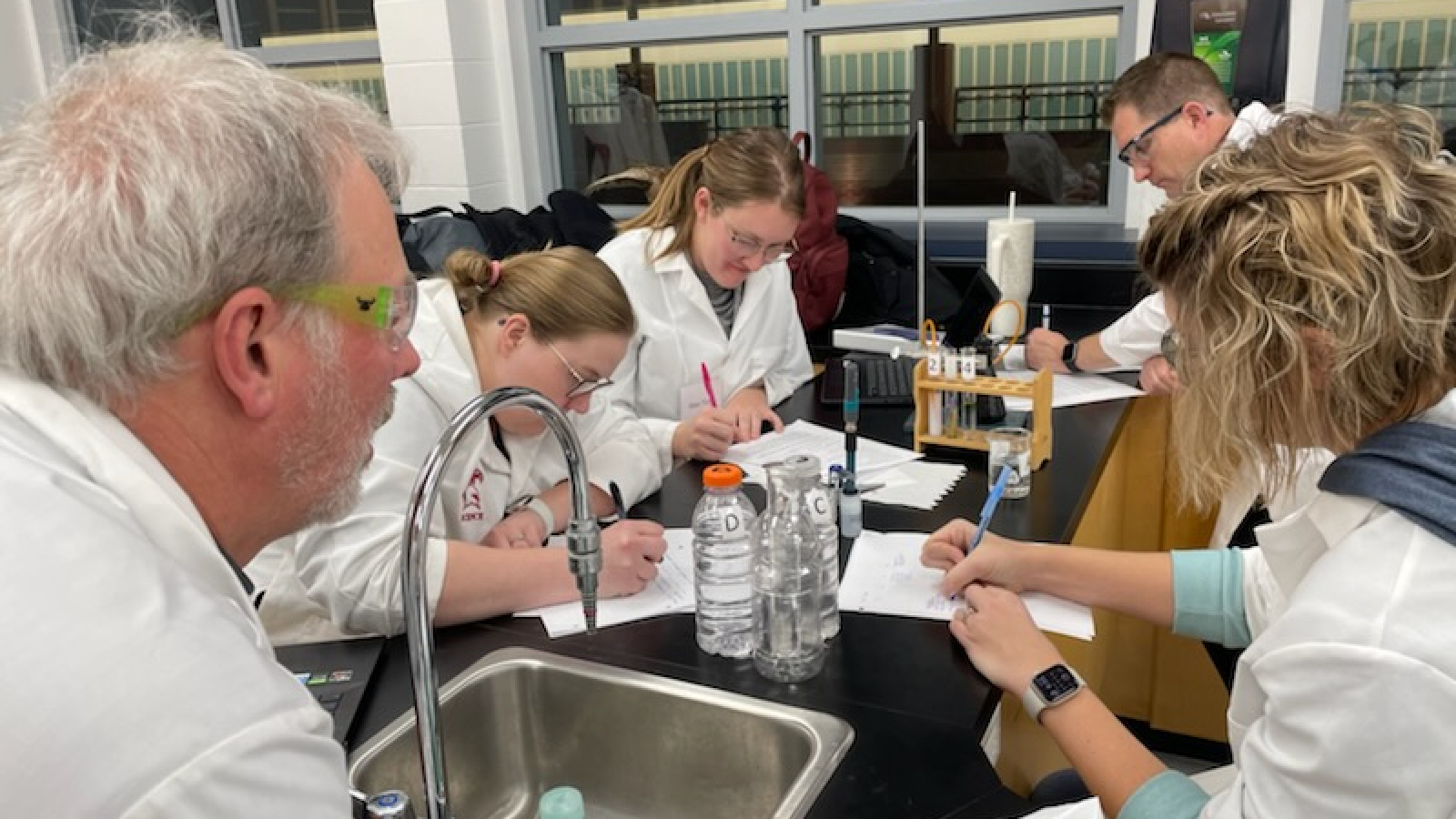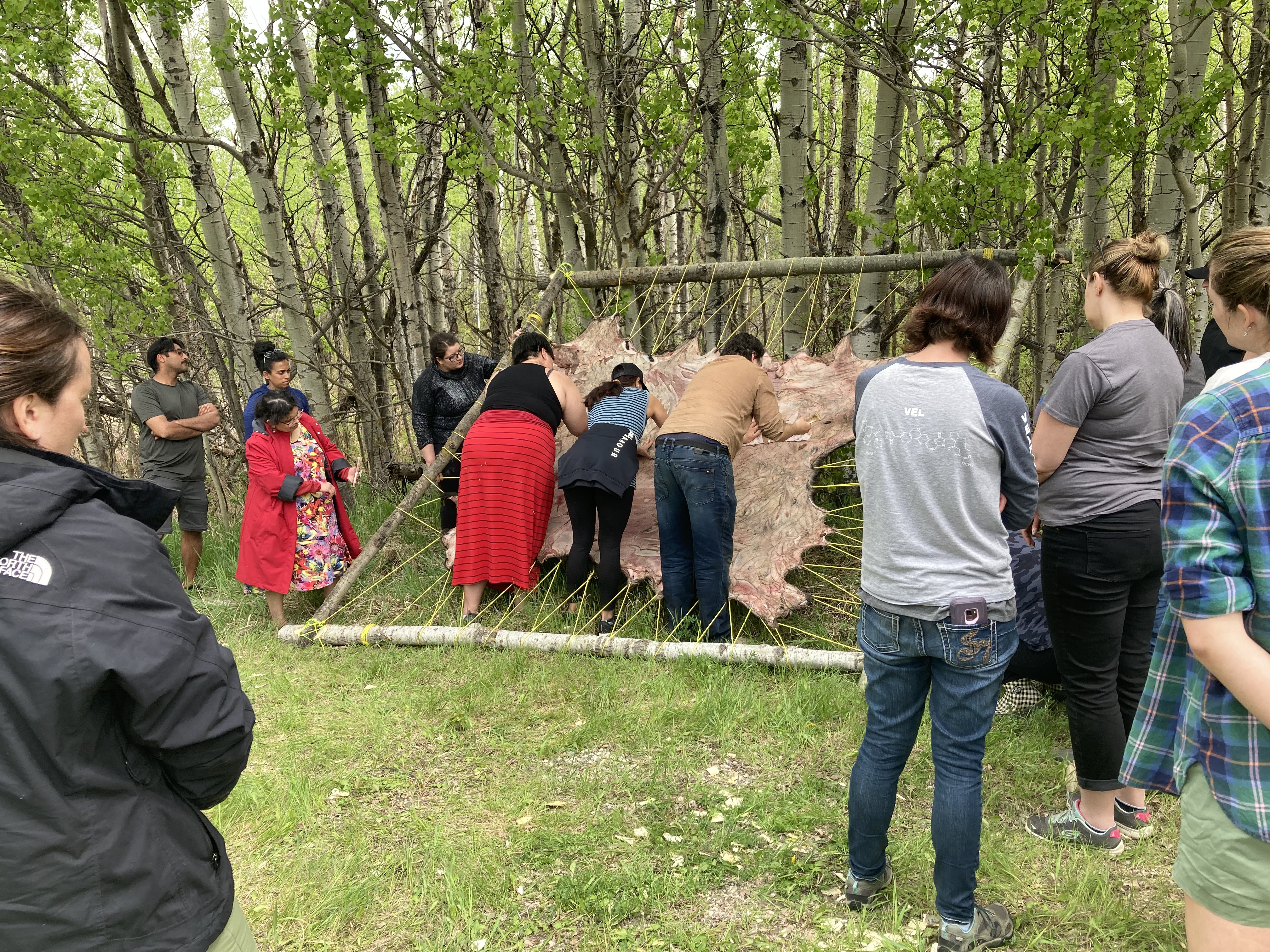CMASTE celebrates three decades of STEM education innovation
Scott Lingley - 23 May 2024

In 2016, science education professor Jerine Pegg had barely assumed the role of co-director at the Centre for Mathematics, Science and Technology Education (CMASTE) based in the Faculty of Education when an opportunity arose for the Centre to become involved in creating math and science education professional development modules in Oman. But it was an opportunity that could only be advanced in person so, about a week later, Pegg and a retired teacher from Edmonton made the 11,000-km journey to the Middle Eastern nation to show CMASTE’s interest in participating.
“And that turned into a three-year multimillion-dollar project,” Pegg says. “It’s those kinds of things that just come up, and that ability to be flexible but also to draw on our community to respond to those opportunities.”
For three decades, CMASTE has drawn on the U of A’s research, expertise and connections with the wider education community, industry and funding bodies to make an outsized impact on the quality and content of STEM education.
On its website, the Centre invites teachers, academics, students and other education stakeholders to align behind their vision: “It is our dream that we can learn from each other, coordinate our efforts, and truly make Canadian school mathematics, science and technology education the most innovative, exciting and effective in the world.”
But its reach has extended far beyond Canada’s borders, exporting know-how and hands-on support to the proverbial corners of the globe and providing a model for national centres in other countries devoted to improving STEM education. No small feat for a core team currently composed of two faculty members and two part-time support staff working with a modest self-generated budget.
“We call ourselves the little office that can, because we’re not many people but we do quite a bit of work,” says Kerry Rose, CMASTE’s project manager since 2015.
“And that’s because we don’t do all the work ourselves. We hire experienced teachers and academics, we leverage our very powerful science, technology and math community. The strength of CMASTE is that we’re a hub and we have a tremendous amount of expertise in and around our community, and we’re able to use it.”
The founding of CMASTE dates back to the early 1990s when professor Heidi Kass, the Centre’s first director, and her colleagues in math and science education conceived of a hub for research opportunities for grad students, with an eye to creating classroom and professional development resources for Alberta teachers.
“Its origin was with people who spent time in schools and interacted a lot with teachers and made an effort to understand their needs,” says Elaine Simmt, a former CMASTE director and math education professor who retired from the Faculty of Education in 2020. “So there’s a history of providing in-service education in a workshop format so teachers didn’t need to enroll in classes per se.”
From local to international impact
From 1999 to 2004, CMASTE operated with $1 million of funding from Imperial Oil — the name IONCMASTE reflected this relationship — and focused on disseminating these funds for research and resource development.
In 2005, CMASTE appointed as its director Frank Jenkins, a former graduate student of Kass’s and retired Edmonton Public science teacher, who brought his own background and experiences to the role.
“I always saw CMASTE as a hub for getting classroom teachers and Faculty of Education personnel working together, getting faculties to work together, getting teachers involved with the university. I saw the real benefits of having a university research perspective, combining that with a teacher’s curriculum and instruction perspective,” Jenkins said.
“I thought it was important for teachers to gain even a little of the benefit I had gained from grad studies, but most teachers aren’t going to be able to do that type of thing, so therefore CMASTE could act as a facilitator for disseminating some of this research and showing how some of the resources they were developing was connected to research that was being done.”
Decades of pioneering work by Alberta’s innovative STEM educators to build curriculum and pedagogy that resulted in top Program for International Student Assessment (PISA) test scores had drawn the world’s attention to the province, and organizations like CMASTE and the Alberta Teachers’ Association Science Council — of which Kass and Jenkins had both been president — began to receive queries from around the world directly, by way of grad students and faculty members, and through University of Alberta International.
With the support of funders like the Canadian International Development Agency (CIDA), the World Bank, the Inter-American Network of Academies of Sciences (IANAS), the Royal Society and others, CMASTE has facilitated, organized and deployed Alberta academics and teachers to contribute to international initiatives in western China, South Africa and Latin America; operated inquiry-based summer camps for middle-schoolers in Norway; supported the modernization of biology and chemistry education in Iraq; and partnered with grad students in Trinidad-Tobago and Thailand, among numerous other projects. At the same time, academics from abroad have brought their knowledge to Alberta.
“We had people coming from all over the world to speak at our weekly CMASTE seminars,” Jenkins says. “It was an exciting time having big names come from all over the world to visit us. It gave us a confidence. We weren’t afraid to take on anything that came our way, and it kept coming our way.”
From 2006 to 2011, CMASTE also became the Alberta home of the Centre for Research in Youth Science Teaching and Learning (CRYSTAL), one of five centres in Canada funded by the National Science and Engineering Research Council (NSERC) to support research and development of instructional, curricular and assessment resources related to visualization, reasoning and deep understanding in math and science.
Outreach and self-evaluation
For the past 10 years, CMASTE has appointed Education faculty members as co-directors of the Centre for two-year terms, starting with Elaine Simmt and Jerine Pegg in 2015. It was also around 2014 that CMASTE began its relationship with GlycoNet, a network of more than 175 researchers at 35 institutions across Canada including the U of A, focused on cancer, and chronic, infectious and neurodegenerative diseases. While the partnership focused on creating resources and providing educational opportunities for teachers to better understand the importance of carbohydrate research to improving the quality of life of Canadians, it would evolve to include developing educational materials to combat vaccine hesitancy and promote information literacy during the global pandemic.
Outreach efforts also extended to K-12 students, most notably with a scanning electron microscope capable of 30,000x magnification, which visited 350 Alberta schools over the course of a decade and allowed more than 9,000 students to experience this powerful piece of technology first-hand.
Project manager Kerry Rose says there has been a focus in recent years on providing professional development opportunities for teachers and assessing the impact of these efforts.
“The global mandate hasn’t really changed: to support math, science and technology education. It’s always been science and math education academics, a place where practicing teachers were getting some benefit from the Centre,” Rose says.
Professional development opportunities include the long-running monthly CMASTE seminar series featuring presentations on the latest STEM education research from leading scholars, and the condensed, intensive Math and Science Academies that allow teachers to delve more deeply into the concepts they’re teaching.
Helping teachers integrate Indigenous knowledge traditions into science and math education has long been part of CMASTE’s mission, including the recent introduction of the Land-Based Learning professional development series, which brings K-12 teachers to Miquelon Lake for a day-long session in each season with Indigenous knowledge-keepers.
A complement to its professional development and outreach efforts is CMASTE’s support for research in mathematics, science and technology education by providing research grants for its faculty members — in topics ranging from exploring the ethical implications of artificial intelligence on art education; to assessing the evolution of computer science education in Alberta high schools; to investigating how board games might be used to enhance the teaching of spatial and logical reasoning, among others. CMASTE also helps cultivate emerging STEM education expertise by providing graduate and postdoctoral fellows with modest travel grants to support their growth as academics by presenting at conferences.
“Over the past few years, we have also started to conduct research on some of the Centre’s core projects,” says CMASTE co-director Janelle McFeetors. “For example, we are currently interviewing teachers who participated in our first two cohorts of Land-Based Learning to understand their learning about incorporating Indigenous ways of knowing in science classrooms.”

Participants in CMASTE’s Land-Based Learning program take part in the tanning of a moose hide.
Improving post-secondary pedagogy
Having supported professional development for post-secondary educators in other countries for years, CMASTE accepted an invitation from the U of A’s Faculty of Engineering to help its instructors improve their pedagogy. The Scholarship of Pedagogy and Application of Research Knowledge in Engineering (SPARK-ENG) is based on the foundation of situated learning and framework of building communities of practice. The program promotes active participation, collaboration and reflection across the career-span, grounded in evidence-based approaches in higher education and STEM education. Recently, SPARK-ENG has been adapted in an interdisciplinary context for French-speaking educators at Campus Saint-Jean as Connaissance de la recherche éducative pour un enseignement réussi (CRÉER-CSJ) or Knowledge of Educational Research for Successful Teaching.
News of SPARK-ENG’s effectiveness has travelled fast — and far. Pegg and Rose will be headed to Kenya later this spring with support from Academics Without Borders to see how CMASTE might help a technical university there prepare their instructors for the implementation of a competency-based curriculum.
“When they learned about what we had been doing with the Faculty of Engineering, they were particularly interested in that so Kerry and I will do some initial work with them on what it is they want to do, need to do, to adapt to the incoming competency-based education approach,” Pegg says.
“It really is in collaboration with them, as is all our international work. We don’t see ourselves as dropping in as the experts. It is really working with the experts in these countries collaboratively to see how we can bring the experience and expertise we’ve developed at CMASTE to work with their expertise and needs identification.”
McFeetors says that while the scope and emphasis of work based at CMASTE has evolved with the needs of teachers, the advances of STEM education research and its reach into new jurisdictions, the Centre’s role remains the same.
“CMASTE brings together faculty, graduate students, teachers and students from local to international,” she says. “We are a place where various stakeholders connect with a common commitment — to promote and encourage excellence in mathematics, science and technology education."
Feature image: U of A science education professor Greg Thomas leads secondary teachers performing lab experiments to integrate into their classes as part of CMASTE’s Science Academy program.